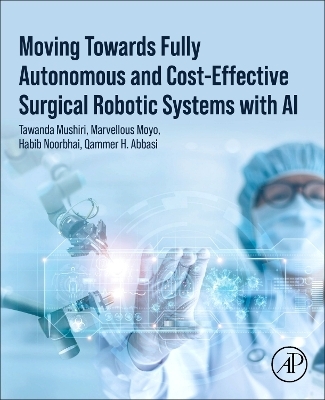
Moving Towards Fully Autonomous and Cost-Effective Surgical Robotic Systems with AI
Academic Press Inc (Verlag)
978-0-443-29894-3 (ISBN)
- Noch nicht erschienen (ca. Mai 2025)
- Versandkostenfrei innerhalb Deutschlands
- Auch auf Rechnung
- Verfügbarkeit in der Filiale vor Ort prüfen
- Artikel merken
Tawanda Mushiri is an Executive Director—Technical (ED-Tech) at the Scienti? c and Industrial Research and Development Centre (SIRDC) in, Harare, Zimbabwe and a Senior Research Associate in the Department of Sport and Movement Studies, Biomedical Engineering and Healthcare Technology (BEAHT) Research Centre, Faculty of Health Sciences, University of Johannesburg, South Africa. His research interests are in AI, robotics, biomedical engineering, medical physics, and healthcare systems design. He is a member of both the Zimbabwe Institute of Engineers and the Engineering Council of Zimbabwe. Marvellous Moyo is a PhD candidate in the Department of Biomedical Engineering at the University of Twente, Enscede, the Netherlands. He possesses advanced skills in engineering design, 3D modeling, and simulation and specializes in the ? elds of robotics, AI, Health 4.0, biomedical engineering, and renewable energy. Prof. Habib Noorbhai, Ph.D. (UCT), is a Professor of Health & Sports Science and serves as the Director of the Biomedical Engineering and Healthcare Technology (BEAHT) Research Centre at the Faculty of Health Sciences, University of Johannesburg (UJ). In line with the 4IR mandate (Fourth Industrial Revolution mandate), he is involved in interdisciplinary work in healthcare technology and innovation spaces. He has a particular interest in how health sciences students can advance their clinical skills using gamification and innovative virtual-based tools. Prof. Noorbhai holds an NRF Y-rating and continues to conduct research within cricket sciences. He has an H-index of 9 with over 50 publications in local and international journals (research articles, conference proceedings, and book chapters). He also serves as a reviewer for local and international health and sports science journals and as an Associate Editor for the BMJ Sport and Exercise Medicine journal. In 2015, he was nominated among Mail and Guardian's top 200 young South Africans. He also won the Mr. South Africa title in 2017, using the platform to spearhead change within health, sport, and education. In 2018, he was later inducted as a Golden Key International Honorary Member at UCT for his contributions to academia, leadership, and service. In 2021, he was awarded the Distinguished Vice-Chancellor’s Award for Teacher Excellence at UJ. Dr. Qammer H. Abbasi is an esteemed researcher and academic known for his significant contributions across various fields. He holds a distinguished educational background, having obtained his BSc and MSc degrees in electronics and telecommunication engineering from the University of Engineering and Technology (UET) in Lahore, Pakistan, graduating with distinction. Dr. Abbasi further pursued his academic journey and earned a Ph.D. degree in Electronic and Electrical Engineering from Queen Mary University of London (QMUL), UK, in January 2012. Currently, Dr. Abbasi holds the position of Reader at the James Watt School of Engineering, University of Glasgow, UK. Within the university, he holds several prominent roles, including Deputy Head for the Communication Sensing and Imaging group, Program Director for Dual PhD Degree, Deputy Theme Lead for Quantum & Nanotechnology, Co-Manager for RF and Terahertz laboratory, and Project Manager for EON XR Centre. His research interests encompass several cutting-edge areas, including antennas for 5G and 6G, Bio-Electromagnetics, nano communication, Reconfigurable Intelligent Surfaces, Terahertz sensing, Internet of Things, biomedical applications of millimeter and terahertz communication, wearable and flexible sensors, antenna interaction with the human body, implants, body-centric wireless communication, non-invasive healthcare solutions, and physical layer security for wearable/implant communication. Dr. Abbasi's exceptional contributions, extensive publication record, leadership roles, and dedication to advancing the scientific community have solidified his status as a highly regarded and influential figure in his field.
1. Introduction to surgical robotic systems design
2. Surgical robotic systems: A literature review
3. Autonomous surgical robotic system modelling
4. Advanced medical imaging approaches and surgical robots
5. Novel machine learning algorithms for surgical robotic systems
6. Novel deep learning algorithms for surgical robotic systems
7. AI and surgical robots control system optimization
8. Design for manufacture and assembly of surgical robotic system
9. Economic and life cycle analysis of autonomous surgical robotic systems
10. Risk assessment and evaluation of surgical robots
11. Prototype fabrication, testing and evaluation
12. Ethics consideration for fully autonomous surgical robotic systems
13. Future of fully autonomous surgical robotic systems
| Erscheint lt. Verlag | 1.5.2025 |
|---|---|
| Verlagsort | San Diego |
| Sprache | englisch |
| Maße | 191 x 235 mm |
| Themenwelt | Informatik ► Theorie / Studium ► Künstliche Intelligenz / Robotik |
| Medizin / Pharmazie ► Physiotherapie / Ergotherapie ► Orthopädie | |
| Technik ► Maschinenbau | |
| Technik ► Medizintechnik | |
| ISBN-10 | 0-443-29894-7 / 0443298947 |
| ISBN-13 | 978-0-443-29894-3 / 9780443298943 |
| Zustand | Neuware |
| Haben Sie eine Frage zum Produkt? |
aus dem Bereich


